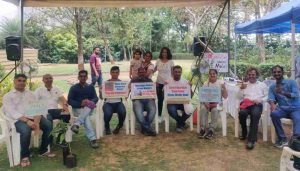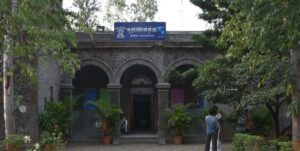Natural farming initiative in Wardha reaches over 5,000 farmers in six years
Pune: 23rd March: After decades of poisoning the soil and water through indiscriminate use of insecticides and chemical fertilizers, people as well as the government are once again realizing the importance of organic and natural agriculture. Jankidevi Bajaj Gram Vikas Sanstha (JBGVS) has been promoting natural farming in Wardha district of Maharashtra over the past six years through Magan Sangrahalaya Samiti (MSS). The project was supported by JBGVS and implemented by MSS from April 2011 to March 2017.
The benefits of the project have reached 89 villages and covered 5,234 farmers, directly or indirectly. Among them, 2,093 farmers have started growing natural produce. A meticulous process including surveys, village level meetings, selection of target villages and farm mapping was followed before implementing the project. The response from farmers to the project has been very good.
Training and demos
Various platforms like meetings, workshops, study tours, farm inspections and Farmers’ Melawas were used to provide training and demos to the beneficiaries on aspects like farming techniques, multiple cropping, seasonal crops, soil management and preparation, natural fertilizers and use of natural pesticides like Dashparni and Brahmastra made from various herbal extracts. The natural farming production centres set up by MSS have been conducting farmers’ schools to impart training on such issues. Moreover, 33 demonstration plots for 17 types of crops were prepared with complete natural inputs. Information on techniques of cotton crop cultivation was given during the farmers’ study tour to Central Institute of Cotton Research.
To help the farmers to collectively register under Agriculture Technology Management Agency (ATMA) – a government initiative – Vidarbh Natural Agri Produce Growers Group was set up. Kisan Mandals have been established in 42 villages in which 1,230 farmers have become members. The rural workshop set up under the project developed four types of hand operated agricultural tools and gave demos of the same. These improved tools helped farmers to conduct operations like clearing the field, making harrows and weeding without employing outside labour.
Seeds and marketing
Farmers were taught to process seeds with cow dung and cow urine (collectively called Bijamrut). Cow urine collection centres were set up in target villages. The demonstration plots exclusively used traditional/local seeds to grow crops. This beautifully showcased the concept of natural farming using local seeds, which are sufficiently productive and also resistant to pests. Explaining the initiative, Dr Vibha Gupta, Chairperson, MSS, said, “A total of 4,173 kg natural seeds were distributed to 427 farmers and they were also encouraged to use household seeds. Beej Utsavs were organized to spread awareness.”
Vidarbh Natural Agri Produce Growers Company was set up under the project to guide the farmers. Along with meetings with existing expert natural farmers; training was provided for processing, marketing and distribution of natural produce so that the right target audiences can be reached. In all, eight outlets were opened for selling natural produce. As a result of these efforts, instead of selling raw farm produce at low cost, the farmers have been selling value added processed products and thereby earning 25% more.
Impact
Commenting on the successful initiative, Col Vinod Deshmukh, Director, JBGVS, said, “Natural farming promises the triple benefits of health, environmental conservation and higher profits due to higher rates in the market and less input costs. This joint initiative with MSS will go a long way in providing sustainable development opportunities to farmers.”
This initiative has significantly reduced the farm input costs on seeds, chemical fertilizers, pesticides and herbicides. For instance, in case of cotton crop they have reduced by 70%. Under the project, 2,980 acres of land are now under natural farming, where cotton, wheat, sorghum, turmeric, sugarcane, gram, flax and vegetables are grown. The market rate for such produce is also higher. For instance, naturally grown sorghum fetches a 22% higher rate, while naturally grown wheat fetches 50% higher rate in the market. Moreover, to reduce malnutrition, the farmers were trained to develop kitchen gardens using natural inputs. The positive impact of this poison free ambience created by JBGVS and MSS in the farms and plates will be felt in the coming years in terms of human health as well as the environment.






